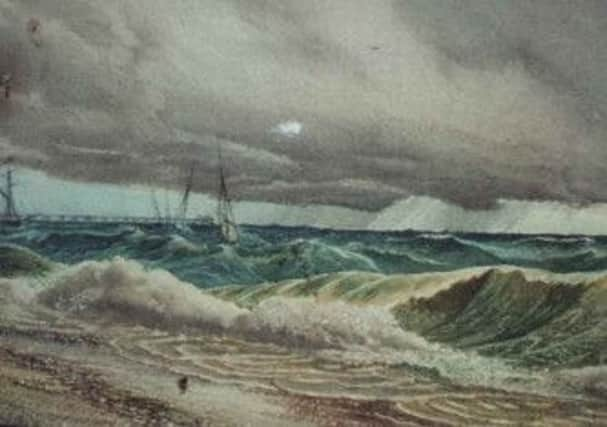RICHARD WILLIAMSON: Nice day out for the toffs, fishing the Sussex coast


Leicester Hibbert, on my mother’s side of the family, had private means and employed himself on grand tours of Europe, painting scenes of the countryside, fox hunting, pheasant shooting and all other usual country pursuits of that era.
Beyond the yachts and fishing boats straining at their anchors in the tumultuous seas, can just be seen the outline of a pier.
Could it possibly be that of Bognor?
Advertisement
Hide AdAdvertisement
Hide AdHis son lived at the time at Walberton Place. One of their stamping grounds was Binderton Woods (subject of this week’s walk) and they visited the coast to the south as well. In those days, sea fishing was hugely popular and was a way for locals to earn their living, taking the toffs out for the experience or in supplying the markets with fish. Bognor pier was opened to the public in 1865.
I am presently reading an account written in 1877 by ‘Wildfowler’, the nom de plume of London-based writer Lewis Clement who spent a winter’s day sea fishing by boat at Bognor before returning on the five o’clock to town.
He caught in a few hours, conger eel, whiting, pouting, gurnard, brill and skate; filling his baskets to overflowing.
Locals were taking crabs and lobsters aplenty in pots as well. How times have changed.
Advertisement
Hide AdAdvertisement
Hide AdHe was a keen observer of people too and here is his account by a professional fisherman of what the locals had to put up with from London seaside tourists: “Whenever there be any promenaders on the pier they be always bothering us fishermen with questions as to fish, where to go, how many they would catch; what would we charge them for an hour, for two hours, for three hours; and could they have it a little cheaper if they went the whole afternoon, or maybe the whole day.
“And then, when they have kept us waiting, and talking, and giving them all the information we can, and offering the most reasonable of terms, they say they will think about it, and we never see them again. I am not going to be humbugged again”.
Clement commiserated. “Some fellows,” he wrote, “dress like awful swells and talk tall to suit their clothes, but they never spend a farthing beyond their cheap lodgings and are always making a grand fuss with the boatmen and fishermen of the place as if these people were inferior beings who ought to be highly complimented that his highness the City clerk, who lowers himself so far as to bring himself on a level with them. It is really laughable.
“But the time is past when a fisherman was a poor devil, literally starving on his earnings.
Advertisement
Hide AdAdvertisement
Hide Ad“Today they make a good living… the swells talk to the fishermen because it looks de bon ton and they like caps to be touched to them, and that is not as it should be”.
I hope my great-grandfather was not one of these ‘swells’. No, surely not.